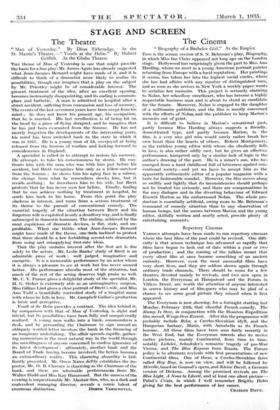The Cinema
" Biography of a Bachelor Girl." At the Empire This is the screen version of S. N. Behrman's play, Biography, in which Miss Ina Claire appeared not long ago on the London stage. Hollywood has surprisingly given the part to Miss Ann Harding, whom we meet as a young American portrait painter returning from Europe with a lurid reputation. Her painting' it seems, has taken her into the highest social circles, where she has had affairs with any number of distinguished men, and as soon as she arrives in New York a weekly paper wants to serialize her memoirs. This project is seriously alarming to Nolan, her schoolboy sweetheart, who has become a highly respectable business man and is about to stand as candidate for the Senate. Moreover, Nolan is engaged to the daughter of a millionaire publisher, and the film is mostly concerned with the efforts of Nolak. and the publisher to keep Marion's memoirs out of print.
It is difficult to believe in Marion's sensational past, partly because Miss Harding always suggests a friendly, domesticated type, and partly because Marion, in the film, is a very nice girl who would surely rather break her own heart than the hearts of others. Robert Montgomery, as the ruthless young editor with whom she obediently falls in love, is also rather oddly cast, but he gives an effective performance, hampered only by a similar lack of logic in the author's drawing of the part. He is a miner's son, who has emerged from a hard childhood full of bitterness against con- ventional society—and yet we have to accept him as the apparently enthusiastic editor of a popular magazine with a taste for fashionable scandal. However, the film moves along so swiftly and lightly that its inconsistencies should perhaps not be treated too seriously, and there are compensations in the racy dialogue and in the diverting behaviour of Edward Everett Horton as the embarrassed Nolan. The whole pro- duction is essentially artificial, owing more to Mr. Behrman's command of comedy situation than to any observation of human beings, but the scenes between Marion and the young editor, skilfully written and neatly acted, provide plenty of entertaining moments.
Repertory Cinemas VARIOUS attempts have been made to run repertory cinemas where the best films of the past could be revived. One diffi- culty is that screen technique has advanced so rapidly that films have begun to look out of date within a year or two of production ; and the coming of the talkies meant that every silent film at once became something of an ancient curiosity. However, even the most successful films have very short lives, and they are seldom shown again through ordinary trade channels. There, should be room for a few theatres devoted mainly, to revivals, and two now open in London, the Everyman, at Hampstead and the Forum in Villiers Street, are worth the attention of anyone interested in screen history and of film-goers who may be glad of a chance to see some good picture they missed when it first appeared.
The Everyman is now showing, for a fortnight starting last Monday, February 25th, that cheerful French comedy, The Slump Is Over, in conjunction with the Houston Expedition film record, Wings Over Everest. After this the programme will probably include Reka, a Czeeho-Slovakian idyll, and the Hungarian fantasy, Marie, with Annabella as its French heroine. All these films have been seen fairly recently in the West End, but the Everyman intends also to revive earlier pictures, mainly Continental, from time to time, notably Liebelei, Schnitzler's romantic tragedy of pre-War Vienna, and The Blue Express from Russia. The Forum policy is to alternate revivals with first presentations of new Continental films. One of these, a Czecho-Slovakian farce called Hey Rup, is now on view, and will be followed by Mireilk, based on Gounod's opera, and Kleine Dorrit, a German version of Dickens. Among the promised revivals are The Blue Light, A Nous la Liberte, and at least one silent picture- Pabst's Crisis, in which I well remember Brigitte Helm giving far the best performance of her career.
CHARLES DAVY.


























































 Previous page
Previous page